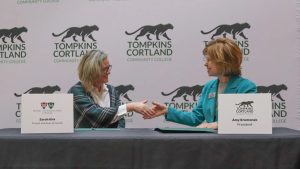Politicians spend a good bit of their time complaining about the media. But why should they have all the fun? I’m going to join in, though I tend to get upset about different things than most sitting politicians do. You see, I don’t actually mind when journalists — whether in print, on television, or online […]
Get Instant Access to This Article
Become a Central New York Business Journal subscriber and get immediate access to all of our subscriber-only content and much more.
- Critical Central New York business news and analysis updated daily.
- Immediate access to all subscriber-only content on our website.
- Get a year's worth of the Print Edition of The Central New York Business Journal.
- Special Feature Publications such as the Book of Lists and Revitalize Greater Binghamton, Mohawk Valley, and Syracuse Magazines
Click here to purchase a paywall bypass link for this article.
Politicians spend a good bit of their time complaining about the media. But why should they have all the fun?
I’m going to join in, though I tend to get upset about different things than most sitting politicians do. You see, I don’t actually mind when journalists — whether in print, on television, or online — treat what politicians say with skepticism. That means they’re doing their jobs.
This doesn’t happen nearly as much these days as it should. A lot of journalists don’t just want to report the news, they want to be players and affect policy. As one observer said, the media is drawn to “superficiality, sensationalism, scandal, and sleaze.” They make building a consensus — the key task of the democratic process — much more difficult.
There are still really excellent journalists out there who are doing their best to serve both their profession and the country. Every day, they struggle to make sense of enormously complex events. What they understand — and what I wish more of their colleagues believed — is that democracy demands journalism that improves its workings. Properly done, journalism can help consensus emerge, improve the knowledge and judgment of voters, and sharpen the performance of public officials and government as a whole.
In the end, the democratic process is about bridging differences. This is virtually impossible without a solid base of information and analysis. Our democracy needs well-informed citizens making decisions based on facts about both policies and politicians.
This means that the model of the journalist that seems to be going out of fashion — reporters who were reasonably objective, independent of outside groups, and even independent of their company’s owners — is actually crucial to representative government. Curious, skeptical journalists who point out inconsistencies, draw attention to mistakes, call out misleading statements, and identify outright lies serve a larger purpose: they provide citizens what they need to know in order to be a good citizen, and public officials what they need in order to do their work well.
This is quite an ideal, especially in this age of economic turmoil within the media universe. But I don’t think it’s too much to hope that as the profession sorts out its future, it takes seriously its leadership role in advancing the public good, and doesn’t sacrifice its part in making representative democracy work properly.
Lee Hamilton is a senior advisor for the Indiana University (IU) Center on Representative Government, distinguished scholar at the IU School of Global and International Studies, and professor of practice at the IU School of Public and Environmental Affairs. Hamilton, a Democrat, was a member of the U.S. House of Representatives for 34 years, representing a district in south central Indiana.



